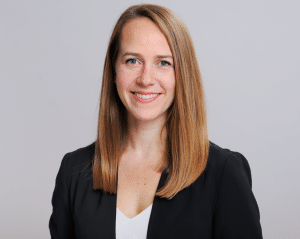Posted on: 03.10.2024
A move overseas can unlock a wealth of opportunities, but it’s not without its challenges. Our Head of Europe Barbara Ozanon recently spoke to Lauren Unger, Managing Director & Digital Communications Lead at FTI Consulting France to discuss her own relocation to Paris from the US, navigating language barriers as a non-native speaker, and her advice for those considering a global career.
Take a look.

What initially made you want an international career?
I’ve always been fascinated by the role that other cultures have on communications and the intersection between people, places, and storytelling. I knew even before I started my career that relocating was something that could potentially be of interest.
Then, about four years into my career, I found myself at a summit where almost all of the speakers talked about the positive impact that international relocation had on their careers.
Hearing the value that it brought to others solidified my own wish to move abroad, and I became more determined to have that experience too. Immediately following the summit, I launched an internal discussion to make it happen.
Why did you choose to relocate to Paris?
My company at the time was headquartered in Paris, and I had studied French since I was young so I could speak French conversationally. As a result, Paris felt like a natural fit.
Almost seven years later, I still appreciate Paris for so many reasons: for its status as a well-connected European hub, for its culture, and for the incredible people I’ve met here.
What would you say was your biggest challenge when relocating?
While I had spent significant time in France before my arrival, I had a bit of office culture shock when I first arrived. It took time for me to adapt my work style so I could better assimilate to the workforce here.
The language barrier also proved to be difficult. While I had some French skills, I was not fluent, and I certainly didn’t have a working level proficiency. Contributing to hour-long brainstorms when you don’t understand half of the words is not easy.
Lastly and perhaps most importantly, I was working French and US hours simultaneously, which proved extremely difficult to balance. Thankfully, this particular challenge was short-lived. I would encourage anyone who is thinking about an internal move to define from the outset what their new working hours will be.
How did you overcome these challenges?
Thankfully, I was surrounded by supportive management and a fantastic team. They all went out of their way to help me, decrypting French work culture, encouraging me to use French in meetings and reassuring me it was okay to make mistakes. The whole experience forced me to be a bit more kind to myself and give myself a bit more grace around working in a new language. Progress is more important than perfection (or at least that’s what I try to tell myself).
Understanding French culture was also crucial – social events, coffees and shared meals with colleagues are important for relationship building in France. Luckily, my colleagues included me in these gatherings from the start, which made it a lot easier to integrate, both professionally and socially.
Based on your experience, would you recommend a “global career”?
Absolutely! Working in Paris has been an enriching experience that’s allowed me to work on creative and complex projects that I wouldn’t have had access to otherwise. The teams I work on are more international and the clients are more global as well. I’ve met incredible people that started as colleagues and have since become best friends. This experience allowed me to build the kind of life I want for myself.
What advice would you give to somebody considering relocation?
First, learn about your new culture. For anyone considering a move or working on an international team, I strongly recommend reading The Culture Map by Erin Meyer. It’s an excellent resource for better understanding how different cultures interact and communicate, especially in the workplace – I learned a lot from it.
Second, it’s so important to know your own value and negotiate well before making the move. Set clear expectations with your employer regarding language requirements, how you’ll work across multiple time zones, and any additional resources you may need (such as language lessons, moving expenses, health care or tax filing support). All of these elements will be crucial in ensuring a successful arrival.
Third, give yourself grace. Living in an entirely new environment means that you will make mistakes and have uncomfortable moments. It’s unavoidable. Thankfully, there’s always a lesson to be learned and it typically makes for an excellent anecdote to laugh over in the future.
And finally, be brave. Do what scares you and push yourself beyond your comfort zone. That’s where you’ll find not only the most valuable work experiences, but the best life experiences too.
If you’re considering a career move overseas and would like support from our team, speak to one of our experts.


























 Career Enquiry
Career Enquiry
